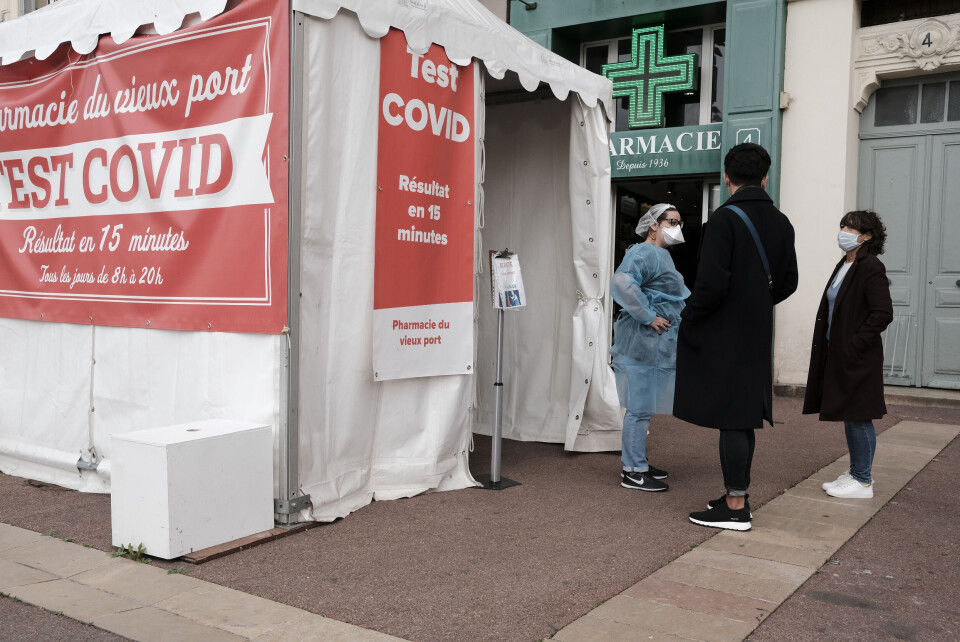-
The curious case of Good Friday: Why only some parts of France get the day off
Three French departments benefit from two extra public holidays
-
How long does it take to sell property in different areas of France? New study
Many major cities are showing signs of recovery when it comes to supply, demand, prices, and time to sell
-
Map: Car insurance costs rise in France - see the average in your region
Multiple studies show that costs are rising by around 5% year-on-year, with major differences by region and vehicle model
Reimbursement rules for Covid tests in France change from March 1
The full cost of tests is now only covered by the social security system for certain groups – but cover is now better for those who have not been vaccinated

From today (March 1), the majority of tests for Covid-19 will no longer be covered 100% by social security.
This means that some people, notably if they have no top-up health insurance, will have out-of-pocket costs for their tests.
Justification for the decision is due to the “improvement of the health situation” surrounding Covid-19, the Direction générale de la santé (DGS) announced yesterday.
Tests carried out by nurses will, for example, be covered only up to 60% of the costs by French social security, and tests by doctors and pharmacists 70%.
Official announcements on this have not included clarification on blood test labs – a common way of obtaining tests – but the changes are stated to relate to all tests carried out in France, so reimbursement at labs is likely to be 60% as this is the standard rate for most other medical tests at labs.
Certain groups, such as high-risk individuals and those with a long-term illness, will still have the full cost of any Covid test paid for.
Complementary (top-up) health insurance will also pick up much of the remainder for those who have this.
Not everyone is happy with the changes, however, with warnings from the leader of the Syndicat des biologistes testing labs union that the current high cost of living will mean those who are not covered are less likely to get a test even if they feel they need one.
Having said this, the new rules are in fact more favourable to the minority of people in France who are not fully-vaccinated.
What are the new rules?
Until today, 100% of the costs of a Covid-19 test were covered by social security payments, with nothing to pay upfront, for those who were vaccinated (with a pass sanitaire), were a Covid contact case, or who had been tested in the last three days.
Current costs for a test if not covered range from €22 for an antigenic test to €44 for a PCR test.
The new rules say that anyone covered by French social security is now at least partly covered for a test, though with a ticket modérateur, referring to a part of the cost that is not covered by social security. This is regardless of vaccination status or whether you have a doctor’s prescription or not.
The changes do not necessarily mean you will have to pay out of your own pocket, however.
“For the vast majority of insured people who have top-up cover," the remaining costs “will be zero,” said the DGS.
The same applies to people on low incomes who benefit from the complémentaire santé solidaire free top-up system.
Read also: Explainer: the CSS, France’s free or low cost top-up health insurance
Who is still covered by social security at 100%?
Certain people will still have 100% of the costs for a test covered, regardless of their insurance status.
This includes those with a declared long-term condition, over 65s, adolescents plus children, and professionals in the medical sector among others.
Exceptions may also be granted for cluster testing in the event of an expected breakout of the virus.
Change in strategy will reduce testing
The changes come as the DGS notes a slowdown of the virus in France, with the danger levels of the epidemic not as threatening as before.
They follow another change introduced in February, where those who tested positive no longer had to isolate, and the Health Authority (HAS) in France is currently considering whether unvaccinated carers and healthcare workers can return to their roles, with their decision expected in early March.
The recommendations of HAS are usually implemented by the government.
Read more: New rules for Covid-19 in France: Testing, contact cases, isolation
Some people are not convinced that the move is the right thing to do, however.
Because of the changes, “some patients will not be tested,” François Blanchecotte, president of the blood test labs union, told FranceInfo.
Testing has already seen a reduction in recent months, and now less than 300,000 tests are carried out per week in France, when in 2021 a peak of almost seven million tests were conducted between December 20 and December 26.
Testing is “already going down… you will no longer find a centre near your home, we are concentrating the test centres,” he added, warning that the decrease in testing has not only health, but economic, ramifications.
More than 10,000 additional people were employed at the height of the Covid-19 crisis, but “at least 50% have already left,” Mr Blanchecotte said.
Related articles
12 changes for residents and homeowners in France in March 2023
Covid: Daily updates on the situation in France
























